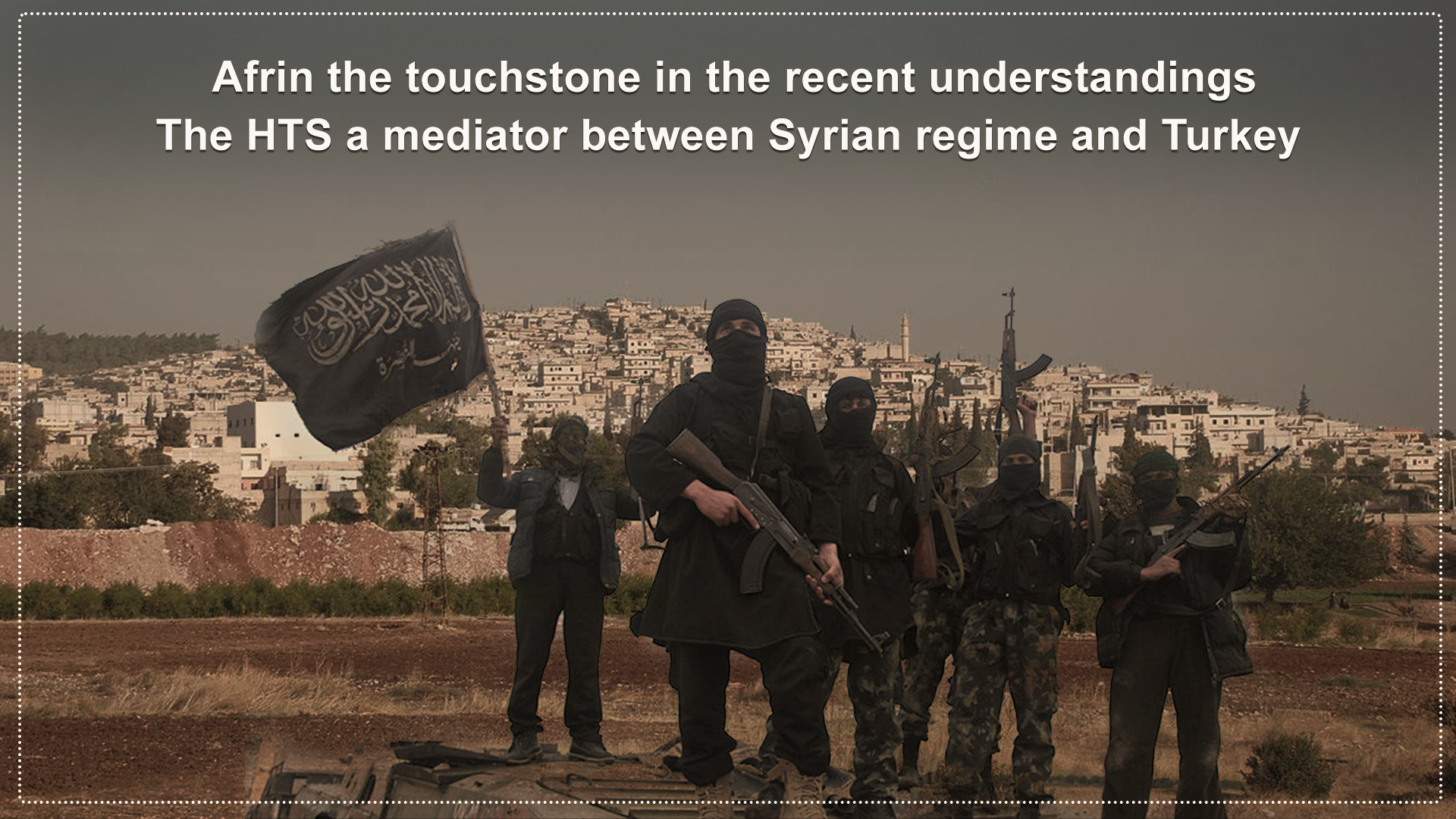Afrin the touchstone in the recent understandings The HTS a mediator between Syrian regime and Turkey
Arjin Deirki

Since the occupation of Afrin, northwestern Syria, Kurdish inhabitants remaining in their homes have been suffering from the barbarism of terrorist factions such as Hamza Division and Sultan Suleiman Shah (al-Amshat) faction, which control the geography of Afrin with direct support from the Turkish occupying state since its occupation in 2018, forcibly displacing its people from it, imposing royalties and kidnapping the people for ransom in front of the eyes of the whole world without moving a finger.
Since the recent statements of the Turkish regime and its desire to normalize with the Syrian regime, the area west of the Euphrates River has witnessed accelerating events that have led to the reversal of the balance of power and the emergence of new alliances in the west of the Euphrates, which has paved the way for a new stage of alignments in line with the Turkish shift towards normalization with the Syrian government. As a result of the deteriorating situation in northern Syria, no one expected Hayat Tahrir al-Sham (HTS, formerly al-Nusra Front) to attack and control Afrin under the control of the Turkish-affiliated factions, such as Sultan Murad, al-Amshat, Hamza Division and other factions that were brought from Ghouta and Homs on green buses and settled in the homes of the Kurds who were forcibly displaced from them.
The Headquarters of the HTS have become the dominant hand in most areas of the western Euphrates, especially Afrin region, which has brought all its institutions and security services to Afrin in order to form a unified entity that oversees the western Euphrates region, as expected by observers and political analysts, in addition to controlling the crossings that share with the Autonomous Administration of North and East Syria (AANES) on one hand and with Turkey on the other which generates millions of dollars per month. All of this comes through the signing of Abo Mohammad al-Julani, leader of the HTS with the leader of the Third Corps of the Syrian armed opposition factions, which began with the alliance between Hamza Division and Al-Amshat with the HTS to form a new unified council to rule the area west of the Euphrates with the withdrawal of the Third Corps towards Kafr Jannah village in the eastern countryside of Afrin, which the HTS took control so that the road was open for it towards Azaz and al-Bab.
The situation led to the clarification of some vague and ambiguous peculiarities and complacency on the part of the Turkish occupier which remained silent for a period of time without interfering in the course of events taking place in and around Afrin, which in turn reduced the role of some forces, the most important of which is the Third Corps, and fenced its activity militarily, the matter gave the HTS more powers and extended its influence. The suspicious silence of Turkey prompted observers and politicians to question the secrets and objectives of Turkey lining these rapid developments on its borders and areas of control, after the two summits (Sochi and Tehran) dashed its hopes of obtaining the green light to start a new military operation in northern Syria and hit the Kurds in the east of the Euphrates. With the upcoming Turkish presidential elections approaching and Erdogan’s desire to win the vote of voters and voices calling for rapprochement with the Syrian regime, it agreed with Russia and Iran to play the role of mediator on rapprochement with the Syrian regime and to play the role of mediator between the opposition abroad and the regime for new cards in the region. To achieve this goal, Turkey decided to abandon the factions or limit their move which in turn lost their role in fighting the regime and have become a burden on Erdogan’s shoulders who wants to get rid of them. As a result, Turkey decided to deal with one unified effective party on the ground in the event of reaching understandings with the regime, and this gives it priority in dealing with this party instead of several parties that are difficult to control.
It is not excluded that all this move by the HTS is one of the Turkish and Syrian intelligence games as a result of several decisions that were agreed upon among themselves with the aim of getting rid of the terrorist factions in northern Syria one by one, and this is one of its results and an initial step for rapprochement between the two regimes.




